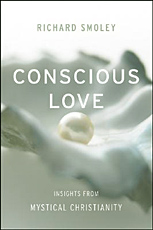"Conscious love is most emphatically not a wholesale rejection of the love of the world. The epigraph to the book you are reading is taken from an agraphon (uncollected saying) of Christ: 'Be competent money-changers!' We can speak of transactional love as 'money-changing.' Christ is urging us to carry out these transactions well and honestly. There are 'holy fools' the world over who have cast aside all social connections and obligations in an attempt to love everyone equally. Sometimes this is noble and beautiful and sometimes it is misguided, but it's not an example that most of us are likely to follow. We will still have our marriages and families and friends and even enemies. (Christ told us to love our enemies, but he did not forbid us to have them.) Those souls who can live on agape alone are probably as rare as those Catholic saints who are said to subsist by eating nothing but the consecrated Host.
"Yet it's also true that Christ cast the money-changers out of the Temple. Whether or not he really did this in a historical sense, the symbolism of this act seems clear. There is a place for transactional love, for 'money-changing,' and there is a place for conscious love, symbolized by the Temple. But we are not to mistake our transactions for higher love. To confuse the two is to pollute both. This may seem an obvious point, but in practice it's not always so. Take, for example, the usual course of a romance. A woman falls in love with a man; she wishes him nothing but the highest good; she imagines sacrificing herself completely for his sake. But if the man should slight her, another side of her nature manifests. She suddenly wishes for multitudes of evil to descend on his head, and she realizes, if she cares to look, that her supposedly unconditional love was hedged around with any number of unseen conditions. (Men, of course, do exactly the same thing.)
"Are we, then, to keep agape and transactionality separated in airtight containers? No. The entire thrust of this book is meant to suggest not that there is a rigid divide between agape and the love of the world and that the one must be renounced for the other (although many have made this mistake) but rather that each type of love contains a sort of gamut that runs from our basest impulses to our highest. In romantic love, there is the kind epitomized by the subtle manipulations of the Equation, as played out by pickup artists and the feminine wiles of The Rules; there is also the kind that, as Solovyov reminds us, sees an 'absolute significance' in the other. Marital love can range from a type of bonding that hardly differs from the monogamy of birds or apes to the 'conjugial love' that Swedenborg contends even thrives in heaven. A parent can love a child as a kind of possession, or he can see in her the transcendent face of a unique cell in the cosmic human. Friendship can consist of little more than an elaborate mutual exercise in internal considering, or it can express the kind of relationship that the Orthodox Church celebrates in adelphopoesis. Each of these forms of worldly love has its roots in the ordinary quid pro quo that is the essence of biological survival, but each also has a tip that extends to the higher dimensions, where it can breathe the air of absolute freedom and joy.
"The Gospels urge us to allow conscious love to permeate ordinary love, to infuse our transactions with a broad and to some degree indiscriminate generosity. We are told to be competent money-changers, but we are also told to forgive others their debts and to give so that the left hand does not know what the right hand is doing (Matthew 6:3). (Traditionally the left hand is the side of judgment and severity, the right hand, the side of mercy and charity.) Many of Christ's most central teachings have to do with this issue:
"Ye have heard that it hath been said, An eye for an eye, and a tooth for a tooth:
"But I say unto you, That ye resist not evil: but whosoever shall smite thee on thy right cheek, turn to him the other also. And if any man will sue thee at the law, and take away thy coat, let him have thy cloke also.
"And whosoever shall compel thee to go a mile, go with him twain (Matthew 5:38-41).
"Conscious love in this sense forms the main thread of nearly all the ethical teachings in the Gospels, which in themselves constitute a set of techniques for practicing this love on a day-to-day basis and enabling it to take root in the soul and spirit. The idea of conscious love can be seen as the theory behind the practices, not only rendering them understandable and reasonable but also enabling us to feel them more deeply and carry them out more faithfully."
